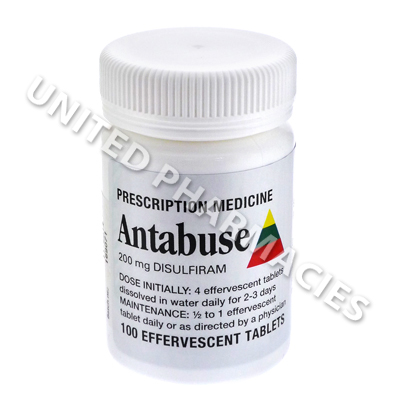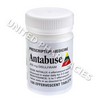Customers also like
Spectra 25 (Doxepin) - 25mg (10 Capsules)
from only £3.39
Spectra 75 (Doxepin) - 75mg (10 Capsules)
from only £5.00
Silybon (Silymarin) - 140mg (10 Tablets)
from only £4.48
Acamprol (Acamprosate) - 333mg (6 Tablets)
from only £2.18
Atarax (Hydroxyzine Hydrochloride) - 25mg (15 Tablets)
from only £3.15
Selincro (Nalmefene) - 18mg (14 Tablets)
from only £114.90
Description
| Main Use | Active Ingredient | Marketed Name |
| Treating alcoholism | Disulfiram | Antabuse |
Uses
Antabuse (Disulfiram) is used in combination with therapy and counselling for alcoholism. This medicine works by triggering unpleasant symptoms which are similar to a hangover when alcoholic beverages are consumed. The active ingredient is known as an aldehyde dehydrogenase inhibitor and its method of action involves affecting the body's metabolisation of alcohol.
After alcohol is consumed, the body breaks it down into acetaldehyde, which is then further metabolized in the liver by aldehyde dehydrogenase (a type of enzyme). Administration of this medicine inhibits the action of aldehyde dehdyrogenase and prevents the body from properly breaking down alcohol. Because of this, acetaldehyde accumulates in the blood.
The high amount of acetaldehyde in the blood triggers dizziness, nausea, vomiting, headaches, anxiety and other symptoms. As a result of this, the possibility of sickness acts as a deterrent to consuming alcohol and may assist chronic alcoholics treat their condition. Studies have taken place on this medicine based on its effects if used for HIV treatment, as well as to investigate potential antiprotozoal action and effects on cancer.
Dosage and Administration
Antabuse (Disulfiram) comes as 200mg effervescent tablets for oral administration. Your doctor will tell you how to take the medicine. These tablets are dissolved in water. In some cases, patients will be told by their doctor to take 4 tablets per day for 2 to 3 days. After this, the doctor may reduce the dosage for maintenance treatment and tell the patient to take 100mg to 200mg per day, with the exact amount decided by the doctor. Treatment will for as long as the doctor providing treatment decides, and may range from 6 weeks to 6 months. Medical supervision may be needed during treatment.
Side effects
Patients affected by alcoholism who are taking Antabuse (Disulfiram) as a treatment for their condition may notice some side effects, such as:
- Acne
- Fatigue
- Headache
- Feeling drowsy
- An unusual taste in the mouth
Ensure that any side effects you experience are reported to the doctor who is treating you. It is worth noting that serious reactions will require immediate medical attention. Examples of this include changes in behaviour, seizures, visual disturbances, severe vomiting, discoloured urine and other reactions that have not been listed here.
Precautions
Under no circumstances should a patient be given this medication without their full knowledge and consent.
If you have consumed any alcoholic beverages within the last 12 hours, do not take this medicine.
Seek immediate emergency medical attention if you suffer an allergic reaction. Symptoms to watch for, which may be indicative of a reaction, include skin rashes, hives, swelling of the face or limbs, trouble breathing, and trouble swallowing.
Always use Antabuse (Disulfiram) as you have been prescribed by your doctor. Never self-medicate or change your dosage without first consulting your doctor. The correct dosage can vary depending on your health, medical history, and the severity of the condition being treated.
This medication may not be safe for all patients. Before you begin using it always disclose the following to your doctor:
- If you are pregnant or breastfeeding.
- If you suffer from any allergies.
- If you suffer from any other health conditions or illnesses.
- If you are using any other medicine (including all non-prescription).
- If you are using any supplements, vitamins, or herbal products of any kind.



-Cap-25mg-UK-1s.jpg)
-Cap-75mg-UK-1s.jpg)

-Tab-333mg-UK-1s.jpg)
-Tab-25mg-UK-1s.jpg)
-Tab-18mg-UK-1s.jpg)



